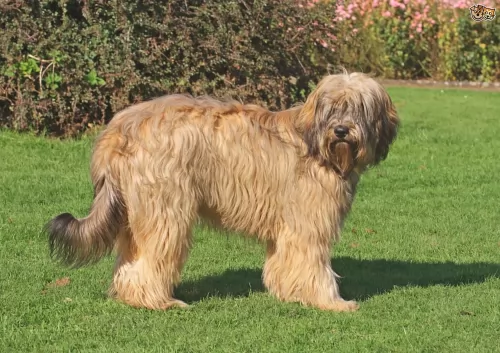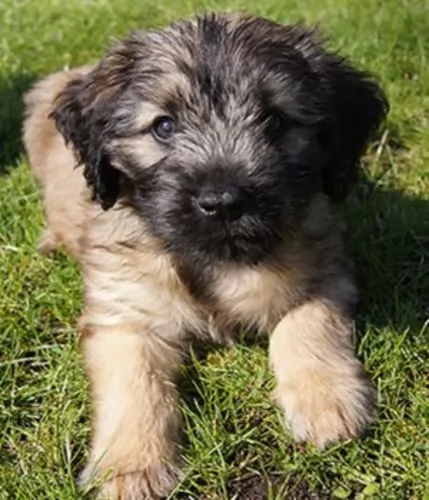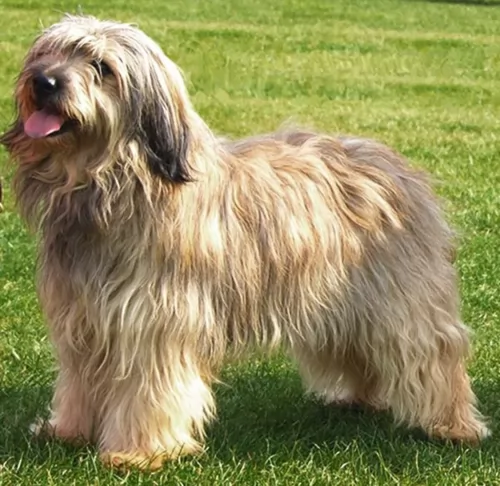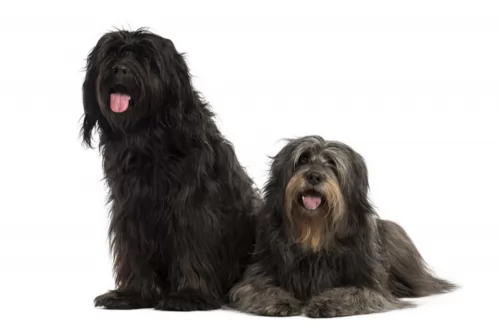 Petzlover
Petzlover Both Catalan Sheepdog and Spanish Pointer are originated from Spain. Catalan Sheepdog may grow 12 cm / 4 inches shorter than Spanish Pointer. Both Catalan Sheepdog and Spanish Pointer are having almost same weight. Both Catalan Sheepdog and Spanish Pointer has almost same life span. Both Catalan Sheepdog and Spanish Pointer has same litter size. Catalan Sheepdog requires Moderate Maintenance. But Spanish Pointer requires Low Maintenance
Both Catalan Sheepdog and Spanish Pointer are originated from Spain. Catalan Sheepdog may grow 12 cm / 4 inches shorter than Spanish Pointer. Both Catalan Sheepdog and Spanish Pointer are having almost same weight. Both Catalan Sheepdog and Spanish Pointer has almost same life span. Both Catalan Sheepdog and Spanish Pointer has same litter size. Catalan Sheepdog requires Moderate Maintenance. But Spanish Pointer requires Low Maintenance
 The Catalan Sheepdog, known also as the Gos d’Atura, hails from Catalonia, Spain. It is believed that the dog is related to the Portuguese- and Pyrenean Sheepdogs.
The Catalan Sheepdog, known also as the Gos d’Atura, hails from Catalonia, Spain. It is believed that the dog is related to the Portuguese- and Pyrenean Sheepdogs.
The standard for this breed was formulated in 1929. The sheepdog developed during Roman Empire times between 200 and 100 BC already, being used as livestock guard dogs. With the breed dwindling in the 1970s, Catalonian Sheepdog lovers started promoting it, but it remains a rare breed.
 The Spanish Pointer is a large hunting breed. The dog hails from Spain and it is believed that the dog was used to develop other pointing breeds.
The Spanish Pointer is a large hunting breed. The dog hails from Spain and it is believed that the dog was used to develop other pointing breeds.
It is popular in Spain but fairly unknown beyond Spanish borders. Known as the Burgos Pointer, the official name for the dog is Perdiguero de Burgos.
It is thought that the dog comes from mixing the Pachon Navarra and the Sabueso Espanol. The dog was developed to point out game so they have the typical longish head with the pointing tail.
 The Catalan is a medium sized dog but gives the impression of being bigger than he actually is. He stands from 45 – 55cm in height and weighs between 20 to 25kg.
The Catalan is a medium sized dog but gives the impression of being bigger than he actually is. He stands from 45 – 55cm in height and weighs between 20 to 25kg.
This breed also has double dew claws on the hind feet. He has a long coat which is slightly wavy and available in different shades such as fawn to brownish to dark grey to black. He has floppy, feathery ears and a fairly long, feathery tail. He has quite a bit of hair on he face too, so you’ll notice a beard, moustache as well as hair which covers the eyes somewhat.
Brave and courageous, the Catalan Sheepdog is also intelligent, active and hardy. He has a round face with a friendly, amicable expression. He is totally pleasant and sweet natured. However, in his role as guardian of sheep he took his role seriously, forming a strong relationship with both shepherd and sheep.
He is wary of strangers. Early socialization and training is always important, and while he makes a wonderful family pet, this training and socialization makes him more relaxed and obedient and he gets on well with children in the home as well as with other pets. While he is a placid, docile and gentle pet, he is also looked upon as a protector, and will defend his family.
 The body of this dog is true to the Pointer type of dog with the body being muscular and lean.
The body of this dog is true to the Pointer type of dog with the body being muscular and lean.
He stands at between 62 to 67cm in height and weighs about 25 to 30kg. The ears are quite long and floppy and the tail is usually docked to a third of its length.
The coat which is mostly short can be whitish with tan or brown markings with freckling or it can be a brownish shade with darker brown markings.
The Spanish Pointer is a quiet, calm, gentle dog and not at all aggressive. They’re able to get on well with children and other pets.
They’re dogs that love the great outdoors and aren’t suited to city living. They’re dogs that need a good deal of exercise too. Being intelligent the pointer dog will benefit from training and socialization.
 The Catalan Sheepdog is such an amicable character – he is going to make an awesome pet. He is an intelligent and obedient dog and is easily trained.
The Catalan Sheepdog is such an amicable character – he is going to make an awesome pet. He is an intelligent and obedient dog and is easily trained.
He has been used for guarding- and herding work and as a family pet makes a excellent guard dog as well. Capable of being gentle too, he is everything his human family wants him to be and just becomes a regular member of the family.
 Your attractive Spanish Pointer is such an amicable dog that it is a pleasure to have him around you.
Your attractive Spanish Pointer is such an amicable dog that it is a pleasure to have him around you.
He makes such a splendid pet, but only if their intense exercise needs are catered to. He can’t possibly be expected to spend days in a tiny yard with nothing to do. It would be cruel.
Their top priority is to be out in the fields hunting. Nonetheless he gets on well with children and other dogs, and with the right home and environment you’ll be so glad you chose one of these beautiful dogs as your friend.
 The Catalan Sheepdog is a fairly healthy breed and has a life expectancy of 12, 13 or 14 years. Nonetheless you will still need to watch out with common dog ailments with him, particularly hip dysplasia.
The Catalan Sheepdog is a fairly healthy breed and has a life expectancy of 12, 13 or 14 years. Nonetheless you will still need to watch out with common dog ailments with him, particularly hip dysplasia.
This is a joint and hip disease which can start with symptoms from 6 months of age already. Your dog will be hesitant to play and jump, doesn’t like to go upstairs, tires easily during a walk and develops a hop-like way to walk. You’ll notice that when he lies down, he battles to- or is reluctant to get up again.
X-rays may be required to confirm the diagnosis of hip dysplasia. There are different treatment options, all with the wellbeing of your pet in mind. You don’t want him to have a life of pain and lameness.
 The Spanish Pointer is a healthy dog breed that can live to be as old as 15 if he gets the right care.
The Spanish Pointer is a healthy dog breed that can live to be as old as 15 if he gets the right care.
Like other dogs, they can develop certain health problems, and you want to be aware of cherry eye, ear infections, hip dysplasia and allergies.
These dogs just love to swim, and it can be difficult to keep the inside of his ears from moisture.
Unfortunately wax, dirt and moisture can all cause an ear infection. Ear infections can be extremely painful. You’ll see your dog shaking his head and pawing at his ears. There will be redness inside the ear and possibly a discharge too. He will need to see the vet.
 The Catalan Sheepdog is a working breed, so he is going to need plenty of exercise. While he adapts easily to city- or country life, it will be to his benefit to have a garden to romp in. You will still need to take him for walks and play ball- and rope games with him. This will prevent boredom and destructive behavior from him.
The Catalan Sheepdog is a working breed, so he is going to need plenty of exercise. While he adapts easily to city- or country life, it will be to his benefit to have a garden to romp in. You will still need to take him for walks and play ball- and rope games with him. This will prevent boredom and destructive behavior from him.
The Catalan Sheepdog has long hair so he will need to be brushed twice a week to avoid matting. This will help to remove loose hair too, but also distribute natural oils through his coat, keeping his hair and skin healthy and free from skin rashes and itchiness.
This brushing ensures other benefits as you can simultaneously check him for parasites such as fleas and ticks.
If you feed him commercial dog food, make sure its a high quality one. He is an active breed so will require high protein. Give him some homemade rice, vegetables and meat, and include raw meat in his food from time to time too. Always ensure that there is fresh, cool water constantly within reach.
 As a hunting dog, the Spanish Pointer has always been used to a lot of exercise. If you don’t use him for hunting, you will need to take him on long walks. They just love sniffing around and following a scent. Ball and frisbee games where you get him running will be excellent for him.
As a hunting dog, the Spanish Pointer has always been used to a lot of exercise. If you don’t use him for hunting, you will need to take him on long walks. They just love sniffing around and following a scent. Ball and frisbee games where you get him running will be excellent for him.
The Spanish Pointer is a large hunting dog, so when you choose commercially manufactured dog food, make sure it’s for large breed dogs. Also make sure the food is for active dogs too.
The manufacturers of these dog foods know what vitamins and minerals to include for active dogs like these. Read the packaging carefully and avoid the inferior dog foods as they are full of ingredients that can make your dog sick.
Try and feed your Spanish Pointer some home-made food too. Make sure it isn’t spicy, exotic foods as these can cause digestive problems.
Food such as boiled chicken, brown rice or pasta, sweet potatoes, spinach and carrots are superb, simple food choices for your canine friend. You can chop it up and add some of this to the dry kibble twice a week as a treat for your pet.
Try and add some raw meat to the diet occasionally as this can be helpful in preventing skin infections.
The coat of your dog is short so a good brush twice a week will keep it in tip top condition. If he is super active, with a mitt or damp cloth you can wipe down his fur if it has mud stuck to it. It’s your time to check him over for ticks and fleas as well.